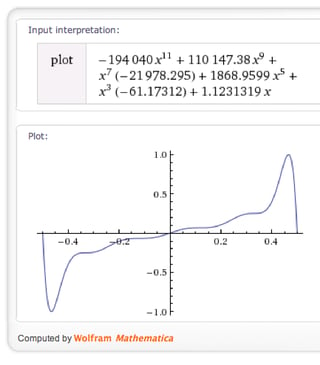It so happens that I recently needed a bound similar to the second part of your question (concerning complex polynomials).
As I already mentioned in a comment above, you cannot have a universal bound on the norm of a solution to $f(1/2)=f(-1/2)+f'(z)$, since there are polynomials where the smallest such solution has norm linear in the degree: taking $f(z)=(1/2+z+\xi(1/2-z))^d$ where $\xi=e^{2\pi i/d}$ is the primitive $d$th root of unity, we have $f(1/2)=f(-1/2)=1$, but the only root of $f'(z)=d(1-\xi)(1/2+z+\xi(1/2-z))^{d-1}$ is $(\xi+1)/2(\xi-1)$, which has absolute value about $d/2\pi$ for large $d$.
On the other hand, there is also a linear upper bound:
Proposition 1: If $f$ is a complex polynomial of degree $d$, then there exists $z$ such that $f(1/2)=f(-1/2)+f'(z)$ and $|z|<\frac1{2(\sqrt[d-1]2-1)}\le\frac{d-1}{\log 4}$.
It follows by applying the following statement to $f(z)-(f(1/2)-f(-1/2))z$:
Proposition 2: Let $f$ be a complex polynomial of degree $d$ such that $f'(z)$ has no roots of norm less than $R$. Then $f$ is injective on the closed disk $\{z:|z|\le\mu R\}$, where $\mu=\sqrt[d-1]2-1\ge\frac{\log 2}{d-1}$.
This can be proved by writing
$$f(v)-f(u)=\int_u^vf'(z)\,dz=(v-u)\left(f'(0)+\int_0^1f'((1-t)u+tv)-f'(0)\,dt\right)$$
(where $u\ne v$, $|u|,|v|\le\mu R$) and using the bound $|f'((1-t)u+tv)-f'(0)|< |f'(0)|$, which follows from
Lemma: If $g$ is a degree $d$ polynomial with no roots of norm less than $R$, and $m>0$, then $|g(z)-g(0)|< ((1+m)^d-1)|g(0)|$ for all $z$ such that $|z|< mR$.
To prove the lemma, write $g(z)=c\prod_{i=1}^d(z-\alpha_i)$. This gives
$$\frac{g(z)}{g(0)}=\prod_i\left(1-\frac z{\alpha_i}\right)=\sum_{I\subseteq\{1,\dots,d\}}\prod_{i\in I}\frac{-z}{\alpha_i},$$
hence
$$\left|\frac{g(z)}{g(0)}-1\right|\le\sum_{I\ne\varnothing}\prod_{i\in I}\frac{|z|}R< (1+m)^d-1,$$
using the assumption $R\le|\alpha_i|$.
EDIT: As I suspected, this is a classical result, and the example with linearly shifted $z^d$ attains the optimal value:
Theorem (Grace, Heawood): If $f$ is a degree $d$ polynomial and $f(u)=f(v)=0$, $u\ne v$, then its derivative $f'$ has a root $z$ in the disk $\left|z-\frac{u+v}2\right|\le\frac{|u-v|}2\cot\frac\pi d$.
Corollary: If $f$ is a degree $d$ polynomial such that $f'$ has no root of norm less than $R$, then $f$ is injective in the disk $\{z:|z|< R\sin\frac\pi d\}$.
Corollary: If $f$ is a degree $d$ polynomial, there exists $z$ such that $f(1/2)=f(-1/2)+f'(z)$ and $|z|\le\frac12\cot\frac\pi d$.
A proof of the Grace–Heawood theorem can be found in M. Marden, Geometry of polynomials, AMS, 1966.

